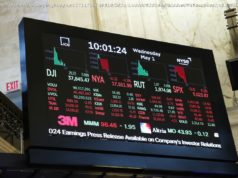The Withdrawal Agreement has been universally panned. But the real problem is buried in the accompanying Political Declaration.
The U. K.’s Prime Minister, Theresa May, has succeeded in what she set out to do. She has brought the country together. Politicians of all colors, along with their supporters, are at last in full agreement. They are united in their hatred of Mrs. May’s Brexit deal. And with reason. It is a terrible deal.
BELFAST, NORTHERN IRELAND — NOVEMBER 23: Democratic Unionist Party leader Arlene Foster greets UK Chancellor Phillip Hammond as he arrives to speak at the DUP party conference on November 23,2018 in Belfast, Northern Ireland. The DUP strongly oppose the proposed Brexit agreement between the EU and the United Kingdom government led by Prime Minister Theresa May. (Photo by Charles McQuillan/Getty Images) Getty
Criticism of the deal has centered on the terms of the Withdrawal Agreement, and in particular on the proposed “ backstop ” to ensure that Northern Ireland’s border with Ireland remains open after Brexit. Arlene Foster, the leader of Northern Ireland’s Democratic Unionist Party (DUP), called for Mrs. May to “ bin the backstop.” But what is this backstop, and why does the EU think it is necessary?
After Brexit, the border between Northern Ireland and the Republic of Ireland will become an international border, rather than an intra-EU border as at present. In the absence of a trade agreement, both the EU and the U. K. would be obliged to apply the WTO’s “ Most Favored Nation ” (MFN) rules on that border. This would mean tariffs and regulatory checks on a border which is politically highly sensitive, because of its long history of conflict, and economically extremely important to the economies of Northern Ireland and its southern neighbour.
Neither the U. K. nor the EU wants there to be a hard border between Northern Ireland and Ireland after Brexit. But preventing one is proving difficult. The U. K. Government proposed technological solutions that it said would eliminate the need for actual checks at the border, but the EU doesn’t believe that the technology exists. The EU proposed a temporary arrangement which would keep Northern Ireland in the Customs Union and Single Market until a free trade agreement could be negotiated, but the U. K. objected on the grounds that customs checks on goods in transit between Northern Ireland and the rest of the U. K. would undermine the U. K.’s own internal market.
The Withdrawal Agreement breaks this deadlock by providing for the U. K. to remain in the EU’s Customs Union, and Northern Ireland in the Single Market, not merely until the end of the transitional period scheduled to end in December 2020, but until a replacement trade agreement can be negotiated, or (potentially) indefinitely if none can be agreed.






